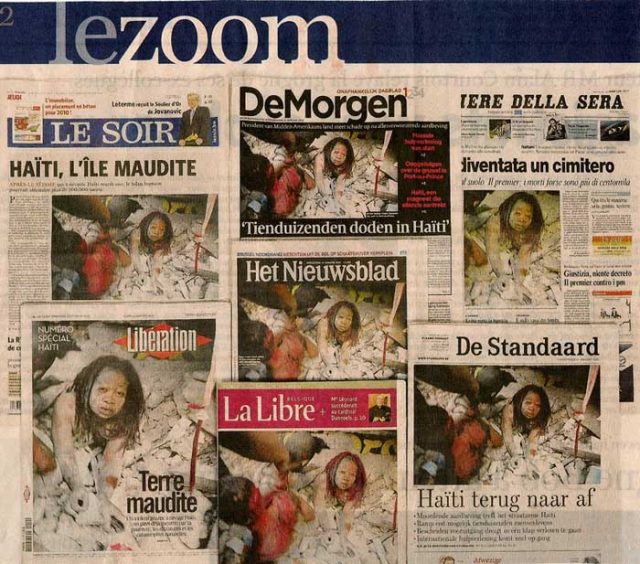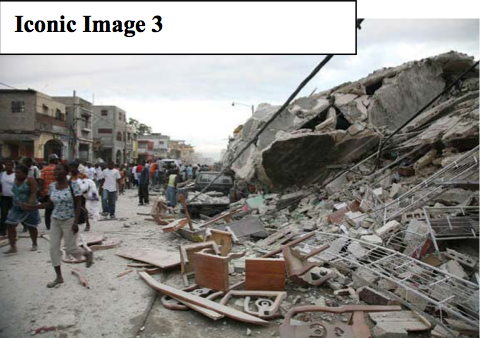
When Haiti was devastated by an earthquake in early 2010, not many professional-quality photos of the disaster were immediately available. Haiti is one of the poorest countries in the world; before the quake, very few journalists were stationed there.
It became one of the seminal events in which Twitter showed that it could fill the void, and its value quickly became apparent to media companies. But the use of photos found on Twitter during that disaster by one newswire, Agence France-Presse, turned into a confused morass of erroneous bylines and ultimately, copyright litigation. Daniel Morel, a photojournalist whose photos were placed on the AFP newswire without payment, turned to the courts in March 2010, claiming AFP had violated his copyright. AFP responded with a few different defenses; its boldest, almost shocking defense was that the Twitter terms of service actually granted it a license to use whatever photos it could grab off the micro-blogging service.
The AFP v. Morel lawsuit was widely reported because it was one of the first cases to explore the intersection of copyright law and Twitter's terms of use. Today, nearly three years after the lawsuit began, a key opinion [PDF] has been issued, ruling in favor of Morel and against AFP. The French newswire did manage to win a limitation on damages, but it could still be liable for hundreds of thousands of dollars.
A brief history of some instantly iconic photos
Daniel Morel took several photos on the day of the earthquake and posted them to Twitter using TwitPic, explaining they were available for purchase. His photos were illegally copied, however, by Lisandro Suero, a resident of the Dominican Republic who claimed them as his own and sold them to AFP. The French newswire then shared the photos with the Getty photo service—a common practice for AFP, which has a licensing deal with Getty and gives Getty about 1,500 to 2,000 photos each day, according to court documents. The photos were distributed worldwide and became "iconic," as Morel's lawyer later wrote.


The photos got the attention of a lawyer at Corbis, a photo agency that competes with Getty. Morel, an experienced Haitian-American photographer, had signed on with Corbis as his exclusive licensing agent, and the Corbis lawyer wanted to know why she was seeing photos in the world's newspapers that had bylines reading "Daniel Morel/AFP/Getty Images."
What followed was a complete mess, as AFP and Getty both tried to put the proverbial genie back in the bottle. AFP deleted all Morel photos off its servers and sent out a "kill notice" about the photos, reading:
"MANDATORY KILL == MANDATORY KILL == MANDATORY KILL -- Due to a recent copyright issue, we kindly ask you to kill from all your systems Daniel Morel Pictures from Haiti. We are sorry for any inconvenience; thank you for your cooperation."
Getty reported deleting 24 Morel "assets" from its servers, and the "kill notice" was sent on to Getty's customers. However, not all of the Morel photos came down. They were hard to find, especially since some were running under the erroneous byline of Lisandro Suero. The Washington Post, for example, published three photos under Suero's byline and one under Morel's. Morel's photos had also been featured on ABC, CBS, and CNN, and published in USA Today and the Boston Globe.


Morel hired a lawyer and began sending notices out that his copyright had been violated. AFP responded with a preemptive lawsuit [PDF] that contained a surprising argument: that because of Twitter's terms of use, the company was actually allowed to take pictures from Twitter for free. Twitter's terms of use allowed for broad re-use rights, and AFP said that “this broad re-use is evidenced every day when Twitter/TwitPic posts are copied, reprinted, quoted, and republished by third parties." Morel wanted to "inform the world of the disaster," and he did so using Twitter, argued AFP. Twitter did encourage the use of tweets by media in various forms, including broadcast and print journalism; and it warns users that their tweets may well be featured by the media.
Of course, Twitter also had terms of use making perfectly clear to users that "you own your content." That premise is still in its terms of service today, which read: "Twitter has an evolving set of rules for how ecosystem partners can interact with your Content. These rules exist to enable an open ecosystem with your rights in mind. But what’s yours is yours—you own your Content (and your photos are part of that Content)."
Morel responded with a counter-claim for copyright infringement.
Today's opinion [PDF], authored by US District Judge Alison Nathan, makes clear that AFP can't rely on Twitter's terms for what it did with Morel's photos. "Construing the Twitter TOS to provide an unrestrained, third-party license to remove content from Twitter and commercially license that content would be a gross expansion of the terms of the Twitter TOS," wrote Nathan.
She similarly disposed of AFP's argument that it is entitled to a "safe harbor" under the DMCA, because it doesn't fit the meaning of an "online service provider" under that act. Getty argued that because it just passively received photos from AFP, it should be off the hook, since it hadn't engaged in "volitional conduct"; the judge was unimpressed by that argument, too.
Some issues are still left for a jury to decide, assuming the case doesn't settle, including whether copyright was infringed willfully or not.
No 'massive' damages for photojournalist
Considering AFP's case looked like a real longshot, it's worth asking: why did the news agency not settle? In addition to the legal costs and risk of losing, there's a fair amount of PR pain in a global newswire fighting in court with a small-time photojournalist who got lucky on a big news day.
Part of the answer may lie in the damages section of today's order, which suggests that Morel was seeking a massive windfall from the case. Now, he may be on his way to winning the case, but he won't get anywhere near the sum he was looking for.
Morel had urged the court to find that every illegal reproduction of his photograph by all of Getty's and AFP's members was an individual infringement, entitling him to statutory damages under the DMCA, which would range from $2,500 to $25,000. That would entitle him to a minimum of $4,445,000, and up to more than $44,000,000. (Doing the math in reverse, that means Morel's lawyer found 1,778 instances of infringement.)
But Nathan found that AFP could only be liable once for each alleged "violative act," not every individual copy of a photo found anywhere. According to the judge's order, an AFP employee sent a total of eight Morel photos to the AFP photo desk; that would put the damages in a more limited universe of between $20,000 and $200,000. That amount is still far more than Morel could have possibly hoped to get had he managed to sell his photos on the day of the quake. Getty and The Washington Post, also defendants in the suit, may also have separate liability with similar ranges.
At this point, AFP should see that it clearly isn't going to win this case; and Morel should be able to see that he isn't going to become a millionaire because of AFP's mistake. After both parties take a breath and reduce their expectations, they may be able to reach a settlement.
It's become common for news agencies to feature all kinds of content found on Twitter in their articles and broadcasts. But this ruling suggests what behavior is clearly out of bounds. Distributing photos on a commercial basis—with an incorrect byline to boot—evidently falls in that category.
Joseph Baio, Morel's lawyer, told Reuters today that the case showed commercial news use of Twitter photos is illegal, and the trial will determine what the consequences should be.
Twitter was never a party to the case. A Twitter spokesman asked about the case today simply reiterated the company's policy, that "Twitter users own their photos."
reader comments
55